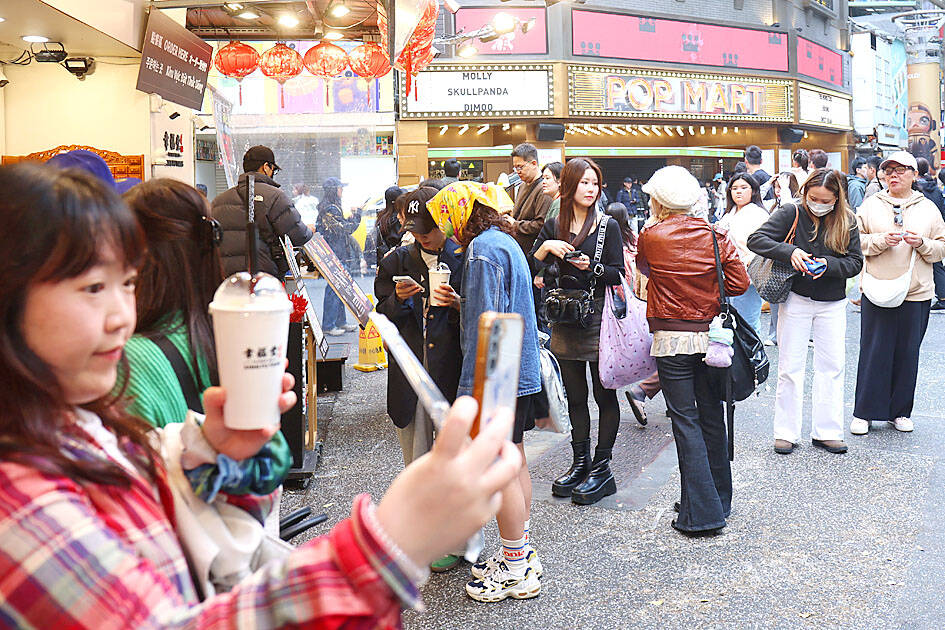The government’s business climate monitor last month turned “yellow-red” from “red,” indicating that Taiwan’s economy continued to expand, although some barometers slowed because of fewer working days, the National Development Council (NDC) said yesterday.
The composite score shed 4 points to 34, but both indices of leading indicators and coincident indicators moved up, affirming steady growth, the council said.
“The slowdown had much to do with the Lunar New Year holiday and the government is closely watching for any shift in economic trend,” NDC Department of Economic Development Deputy Director Chen Mei-chu (陳美菊) told a news conference.

Photo: CNA
The council uses a five-color spectrum to describe the nation’s economic state, with “red” signifying a boom, “green” indicating stable growth and “blue” suggesting sluggishness. A dual-color reading means the economy is shifting gears to a better or worse state.
The yellow-red signal came after exports gained momentum, but manufacturing sales, as well as wholesale and retail revenues, were subdued, the council said.
Tech firms remained busy to meet demand from global customers for electronics used in artificial intelligence (AI), but non-tech firms’ operations slowed in observance of the Lunar New Year after frontloading activity ahead of expectations of tariff hikes subsided, Chen said.
The index of leading indicators, which seeks to project the economic scene in the coming six months, increased 0.32 percent, up for a second straight month, as export orders, imports of semiconductor equipment and manufacturing business confidence displayed positive momentum, the council said.
Companies received more orders for information and communications technology products, as AI applications widened, which is favorable to exports, Chen said.
Likewise, the index of coincident indicators, which reflects the current economic situation, edged up 0.2 percent to 104.28, as industrial production, overtime hours and imports of machinery equipment improved from one month earlier, the council said.
In related developments, Taiwanese grew slightly more confident about spending this month, judging by an uptick of 0.05 points in the consumer confidence index to 72.59, a monthly survey by National Central University (NCU) released yesterday showed.
Specifically, people turn mildly more optimistic about Taiwan’s economic outlook, household income, the job market and purchases of durable goods, noticeably real estate, it found.
The positive-leaning sentiment came despite US President Donald Trump’s threat to impose tariffs on semiconductors, which bodes ill for Taiwanese chipmakers, NCU economics professor Dachrahn Wu (吳大任) said.
However, people expressed concern over the consumer price trend amid fears that the electricity prices might rise later this year after the legislature canceled a budget to aid lossmaking Taiwan Power Co (台電), Wu said.
Electricity price hikes would fuel inflation, he added.

In Italy’s storied gold-making hubs, jewelers are reworking their designs to trim gold content as they race to blunt the effect of record prices and appeal to shoppers watching their budgets. Gold prices hit a record high on Thursday, surging near US$5,600 an ounce, more than double a year ago as geopolitical concerns and jitters over trade pushed investors toward the safe-haven asset. The rally is putting undue pressure on small artisans as they face mounting demands from customers, including international brands, to produce cheaper items, from signature pieces to wedding rings, according to interviews with four independent jewelers in Italy’s main

Japanese Prime Minister Sanae Takaichi has talked up the benefits of a weaker yen in a campaign speech, adopting a tone at odds with her finance ministry, which has refused to rule out any options to counter excessive foreign exchange volatility. Takaichi later softened her stance, saying she did not have a preference for the yen’s direction. “People say the weak yen is bad right now, but for export industries, it’s a major opportunity,” Takaichi said on Saturday at a rally for Liberal Democratic Party candidate Daishiro Yamagiwa in Kanagawa Prefecture ahead of a snap election on Sunday. “Whether it’s selling food or

CONCERNS: Tech companies investing in AI businesses that purchase their products have raised questions among investors that they are artificially propping up demand Nvidia Corp chief executive officer Jensen Huang (黃仁勳) on Saturday said that the company would be participating in OpenAI’s latest funding round, describing it as potentially “the largest investment we’ve ever made.” “We will invest a great deal of money,” Huang told reporters while visiting Taipei. “I believe in OpenAI. The work that they do is incredible. They’re one of the most consequential companies of our time.” Huang did not say exactly how much Nvidia might contribute, but described the investment as “huge.” “Let Sam announce how much he’s going to raise — it’s for him to decide,” Huang said, referring to OpenAI

The global server market is expected to grow 12.8 percent annually this year, with artificial intelligence (AI) servers projected to account for 16.5 percent, driven by continued investment in AI infrastructure by major cloud service providers (CSPs), market researcher TrendForce Corp (集邦科技) said yesterday. Global AI server shipments this year are expected to increase 28 percent year-on-year to more than 2.7 million units, driven by sustained demand from CSPs and government sovereign cloud projects, TrendForce analyst Frank Kung (龔明德) told the Taipei Times. Demand for GPU-based AI servers, including Nvidia Corp’s GB and Vera Rubin rack systems, is expected to remain high,